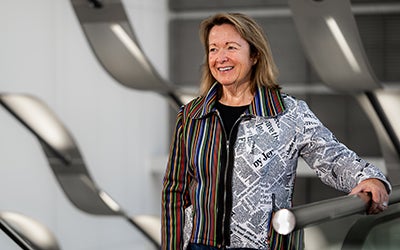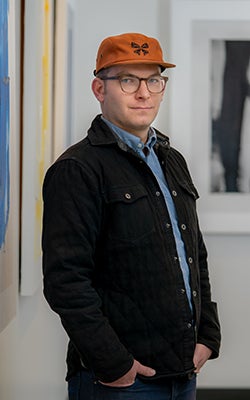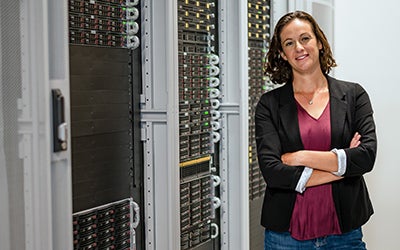
As the lines between business school and business school continue to blur, Leeds’ ability to innovate and adapt keeps alumni at the forefront.
In the business world, change was once considered constant.
Today, the word fails to capture the relentless pace of disruption in which the fortunes of companies seem to change overnight as innovation opens up a new market, enables new ways to connect with customers, or Fundamentally realigns established industry categories.
In navigating this new world, businesses are forced to find new ways to stay agile, anticipate change and rethink risk. A central part of their strategy is finding ways to partner with business schools, which have created and improved programs to ensure graduates add value the moment they start their jobs.
With an emphasis on entrepreneurship, innovation, technology and analytics, it’s no surprise that Leeds is a frequent partner for companies looking for flexible professionals.
“The field is always evolving so fast – something new comes out every year,” said Dan Zhang, Leeds’ interim chair of strategy, entrepreneurship and operations. Every summer, he uses his extensive consulting experience to update his advanced data analytics course, “If you don’t update regularly, you can’t keep up with what’s going on in the industry. It’s a necessity.”
“Data doesn’t disappear”
 Meanwhile, industry has applauded Leeds’ willingness to anticipate the new skills businesses will need in the years ahead. Libby Duane Adams, Alteryx’s Chief Communications Officer, has been at the forefront of industry change since she co-founded the software company with Dean Stoecker (IntBus ’79). As Alteryx has grown, it has started offering scholarships to schools such as Leeds to ensure graduates are equipped with the skills for a change-driven workplace.
Meanwhile, industry has applauded Leeds’ willingness to anticipate the new skills businesses will need in the years ahead. Libby Duane Adams, Alteryx’s Chief Communications Officer, has been at the forefront of industry change since she co-founded the software company with Dean Stoecker (IntBus ’79). As Alteryx has grown, it has started offering scholarships to schools such as Leeds to ensure graduates are equipped with the skills for a change-driven workplace.
“Data is not going away,” she said. “The ability to work with data is now a must-have skill – the more students invest in that skillset and develop their ability to work with data, the richer their career opportunities will be.”
Alteryx also co-hosted a conference in Leeds this summer, which brought together business analytics project leaders to address and begin addressing some of the challenges they shared. The two-day event attracted representatives from nearly two programs across the country, and also showcased industry input through panel discussions and keynote speeches. Kai R. Larsen, director of the Master of Business Analytics at the University of Leeds, said industry engagement demonstrates the scale and speed of change that has disrupted companies in every sector.
The poet warrior, meets the boa constrictor
“Every time we ask CIOs what they want from a recent graduate, it’s always the same. They want a poet warrior,” Larson said. “But really, they want a warrior who also knows how to write Python, and that’s what they test in their onboarding interviews.”
 Of course, data and analytics are driving business conversations. But that’s not all you need to stay up to date. Tim Weiss (MBA’16), co-founder and COO of Boulder-based Optera, said that in his industry, new regulations and changing climate attitudes are driving interest in sustainable management software provider services The essential.
Of course, data and analytics are driving business conversations. But that’s not all you need to stay up to date. Tim Weiss (MBA’16), co-founder and COO of Boulder-based Optera, said that in his industry, new regulations and changing climate attitudes are driving interest in sustainable management software provider services The essential.
“Leeds taught me new business skills and how to market myself for potential opportunities and how to better engage with the Boulder community,” Weiss said. He added: “I don’t know of any courses that specifically teach what you need to know about this industry. It moves so fast.”
Faces of Leeds: Meet Tim Weiss
That said, a glance at the company’s roster reveals quite a few CU Boulder alumni. “When we hire, we try to hire the full package — that means making sure we have fundamentally good people whose values are not optional,” Weiss said. “There are a lot of great people from CU Boulder that fit that model. We do have to train them in sustainability, but they have the skills needed to adapt quickly.”
find good people
In the context of shifting attitudes towards ethics in the workplace, the desire to hire good people — not just Technicians only – is an important consideration. program. More and more professionals want to work for companies that value their values. Just ask Theranos, Facebook, or Uber, they’re all in trouble for the actions of their executives.
In Nunziato’s classes, he sees a segment of students who are very eager to make a positive social and environmental impact.
“But I’m interested in students who see sustainability and ethical leadership as inseparable from their own career aspirations,” he said. “It’s exciting to teach them because they understand that ethical leadership is not an either-or option.”
A focus on values helped Jenny Gerson (EBio’06; MBA’14) transition from an ecologist at the US Forest Service to a sustainability role at the Zayo Group.
 She is now Director of Sustainability at DataBank; the company’s data centers support cloud storage and computing power that puts many companies’ data at their fingertips.
She is now Director of Sustainability at DataBank; the company’s data centers support cloud storage and computing power that puts many companies’ data at their fingertips.
too much information
“One of the ways I keep up with all the changes in the industry is what I learned at Leeds – networking,” she said. She formed a group of more than 100 sustainability professionals, including several Leeds alumni, mainly from small and medium-sized tech companies in the Denver area.
“When you have a network like this, any time something goes wrong, you can go to someone right away and get a different perspective on what that means for your own work,” Gerson said. “There’s so much information out there — so much, really — that it’s incredibly valuable to have peers who can help you focus.”

“Work is pretty much a continuation of business school. Things come quickly and you have to figure out how to prioritize them, solve problems and plan ahead.”
Jenny Gerson (EBio’06, MBA’14), Director of Sustainability at DataBank
Leeds is also listening to its network, which helps shape its approach to academic programmes. For example, the school recently created an MBA pathway in Natural and Organic Products to meet the needs of small local businesses and large international businesses seeking insight in organic product strongholds like Boulder. Students in this pathway spend the summer interning at companies such as Jack & Annie’s, Danone and Clorox – proving that the ideas taught in the program are applicable to companies of all sizes.
“Because natural and organic foods have become so competitive, it’s become more difficult to turn a passion project into a thriving business,” said Heather Kennedy, a teaching assistant and consumer marketing expert who has held marketing leadership roles at Whole Foods and Kraft. “These entrepreneurs need business acumen so they can bring their products to market. On the other hand, large consumer goods companies have seen growth in the natural industry and realised that in order to remain competitive they need to move in that direction.”
Of course, this illustrates the blurring of the line between business school and business school.
“Work has almost become a continuation of business school,” Gerson said. “Things come quickly and you have to figure out how to prioritize them, solve problems and plan ahead.”
Business of Leeds Magazine Graduate courses Socialize with Leeds
Course Updates
At Leeds, teachers use industry relationships to ensure they meet the current and future needs of the workplace when course changes are considered.
Master of Accounting and Taxation director Joshua Neil said input from the Big Four professional services firms and changing CPA exam requirements had prompted Leeds to add more technical subjects to the curriculum.
“Accounting firms have been asking what we’ve been doing in this space, probably over the past five years,” Neal said. “For analytically inclined students, we were able to guide them through some specialized electives. But over the last 18 to 24 months, data has become more mainstream — you’re seeing textbooks now with tools like Tableau embedded, You’ve heard from our students that they’re being asked to use tools like Alteryx in their internships.”
This fall, Kai Larsen’s analytics course for master’s in accounting students is being revised to focus on bringing in talent from the industry and showing how those skills can be used to help accountants do their jobs better.
“CPAs are doing the same thing – they’re responding to the industry saying we need to be licensed in this area,” Neal said. “We’ve moved from a novel intersection to a realization that we need a lot of work in this area, and if you don’t have these tools, you can be at a real competitive disadvantage.”
The University of Leeds is also increasingly interested in hiring industry-qualified lecturers who will bring real-world knowledge around topics such as licensing requirements and disclosures – changes that may come sooner than textbooks can reflect.
front of the curve
Strong industry links and a first-class faculty roster help Leeds create projects that meet or anticipate real-world needs. A few examples:
according to. The second-year capstone course, the BASE (or B Core Applied Semester Experience) completed by every Leeds student follows an industry-intensive in-depth study of each business discipline. Students learn to combine courses from these disciplines into a real-world project that helps them identify their areas of focus as upperclassmen.
Business + Engineering. Much of the change driving the business world comes from technology and engineering. The program, marked by the new Rustandy Building, offers structured cross-collaboration opportunities for business and engineering students and faculty.
Lovers of brands. Developed by the Deming Center for Entrepreneurship in partnership with the CU Athletics Department, the program provides scholar-athletes with tools to help them understand new rules regarding the use of names, images and likenesses. This vision helped CU enter into a partnership with INFLCR to create the Buffs NIL Exchange.